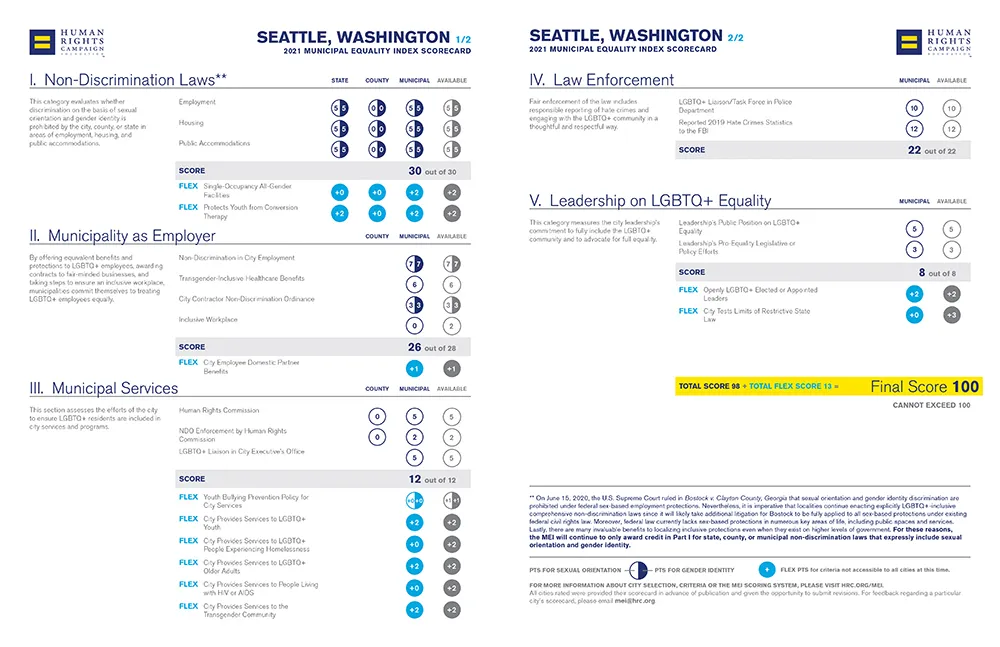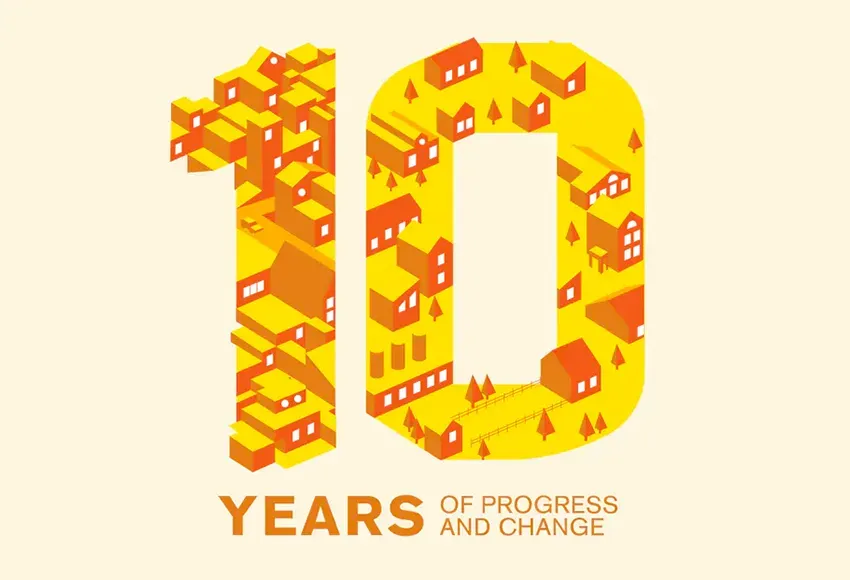On Nov. 18, the Human Rights Campaign released its tenth annual Municipal Equality Index, and Seattle was among the cities that earned the highest score, 100. The MEI, produced in partnership with the Equality Federation, is the country's only assessment of LGBTQ+ municipal policies, laws, and services.
"LGBTQ+ people are everywhere–in every city, county and ZIP code. Throughout its ten-year history, the Municipal Equality Index has been centered on supporting and celebrating the work municipalities do to serve LGBTQ+ people in the places they call home," said JoDee Winterhof, HRC's Campaign Senior Vice President of Policy and Political Affairs.
"This year, state-wide lawmakers have zeroed in on attacking Transgender and Non-binary children–for no reason other than in an effort to harm and erase them. Local leaders, however, have continued to move the needle of progress forward, and by doing so, they have spurred economic growth by signaling to residents, visitors and employers that their city is open to everyone," Winterhof stated.
Statistics and MEI background
According to the report, 181 cities currently offer Transgender-inclusive healthcare benefits to city employees, which is up from 179 last year. The national city score average also hit an all-time high of 67 points, whereas last year's average was 64. Additionally, 43 municipalities have anti-conversion therapy ordinances in states that offer no state-level protection, an increase from 38 municipalities last year.
The MEI assesses each city on 49 different criteria that range from city-wide discrimination protections to policies for municipal employees, city services, law enforcement, and the city's leadership on LGBTQ+ equality.
For this report, Washington DC was excluded from the process, and MEI rated 506 American cities including:
The HRC and the Equality Federation found that more than 74 cities received more than 85 points. Some of these higher-scoring cities were in the 20 states that lack non-discrimination statutes protecting gender identity and sexual orientation. (For comparison, in 2012 there were just five states without such non-discrimination statutes.) Since the 2020 MEI, 35 state averages have increased and only eight cities received zero-point scores.
The report mentions how local municipalities set the standard for LGBTQ+ equity and inclusion through prioritized measures such as enacting nondiscrimination laws and Transgender-inclusive healthcare benefits for city employees.
The report also includes a brief for policymakers on how municipalities can better support Nonbinary and Transgender individuals was also included in the report, and contains information on challenges gender nonconforming individuals face, as well as guidance on anti-Trans and Nonbinary violence prevention.

Washington cities
Ten cities from Washington state were rated in this year's MEI: Bellevue, Bellingham, Kent, Olympia, Pullman, Seattle, Spokane, Tacoma, Vancouver, and Vashon. The city of Seattle received a total of 98 points, in addition to 13 FLEX score points, with a final score of 100. Final scores cannot exceed 100 points, and FLEX points are awarded for criteria that apply only to some cities.
The report scores the cities in five categories. For the nondiscrimination laws category, which evaluates whether discrimination based on gender identity or sexual orientation is prohibited by the city, county, or state in housing, employment and public accommodations, Seattle received 30 out of 30 points.
Municipality as employer is the second category; it focuses on equal benefits and protections for LGBTQ+ employees, inclusive workspaces, and commitment to treating LGBTQ+ employees equally. For this section Seattle scored 26 out of 28 points and received zero out of two points for inclusive workplace at the municipal level.
The municipal services category evaluates Seattle's efforts to ensure LGBTQ+ residents are included in city programs and services, such as services for LGBTQ+ youth and Transgender communities. Seattle received 12 out of 12 points for this category.
The law enforcement category focuses on fair law enforcement, including reporting hate crimes to the FBI, engaging with the LGBTQ+ community in a mindful and respectful manner, and having an LGBTQ+ liaison or task force in the police department. Seattle received 22 out of 22 points in this category.
The last category is leadership on LGBTQ+ equality, which focuses on Seattle's commitment to full inclusion of and advocacy for the LGBTQ+ community, as well as having elected or appointed leaders who are openly LGBTQ+. Seattle received 22 out of 22 points in this category.
In a statement to Seattle Gay News, the Seattle Office for Civil Rights mentioned that, in light of this recognition, they are proud to be a part of the City of Seattle.
"A 100/100 score is truly remarkable, and we recognize that reaching this milestone would not be possible without community organizing and activism, which allows us to listen to and amplify the voices of the LGBTQ+ community, including the City's LGBTQ Commission who offer us counsel and guidance," the Seattle Office for Civil Rights said.
"We do, however, understand that even with this score, there is still more work to be done to truly make our city a more equitable place for the people in our LGBTQ+ community, especially Black, Indigenous, and other transgender people of color who experience violence, both systemic and overt, in our community and across the nation every day.
"This includes harms created by the carceral state in our criminal legal system, where we are seeking to address this through a $1 million grant in our Collective Network fund to support community alternatives to incarceration and policing with a priority focus on Black transgender and gender nonconforming individuals and the broader Black community.
"We will continue to listen to and lift up the LGBTQ+ community here in Seattle, to create the kind of equitable city where all residents and visitors feel safe, valued, and liberated."
MEI All-Star cities
The MEI lists what it refers to as "All Star" cities, which are 75 cities that received a score of 85 points or higher, regardless of being in states with a lack of nondiscrimination protections for the LGBTQ+ community. Last year, there were 61 All-Star cities. This year's All-Star cities are in Indiana; Oklahoma; Kentucky; South Dakota; Missouri; Florida; Kansas; Texas; Arizona; Pennsylvania; North Carolina; Michigan; Alaska; Georgia; Ohio; Alabama; Montana; West Virginia; Nebraska; and Louisiana.
For the top-scoring cities that received 94 points or more:
To learn more about the MEI, report visit https://www.hrc.org/resources/municipal-equality-index


